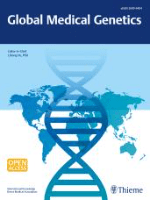
Genetic Testing and Molecular Biomarkers
Scope & Guideline
Advancing the Future of Genetic Research.
Introduction
Aims and Scopes
- Genetic Testing Applications:
The journal emphasizes various applications of genetic testing in clinical settings, including but not limited to, cancer genetics, hereditary diseases, and pharmacogenomics. It explores how genetic tests can inform treatment decisions and patient management. - Molecular Biomarkers Discovery:
A core area of focus is the identification and validation of molecular biomarkers that can serve as diagnostic, prognostic, or therapeutic targets in various diseases. This includes studies on gene expression, epigenetics, and non-coding RNAs. - Population Genetics and Ethnic Variability:
Research addressing genetic diversity across different populations is a prominent theme. The journal publishes studies that investigate genetic polymorphisms and their implications for disease susceptibility and treatment responses in diverse ethnic groups. - Innovative Methodologies in Genetic Research:
The journal highlights advancements in genetic research methodologies, including next-generation sequencing, CRISPR technology, and bioinformatics tools, which enhance the understanding of genetic contributions to diseases. - Clinical Implications and Ethical Considerations:
A unique contribution of this journal is its exploration of the clinical implications of genetic testing and biomarkers, including discussions on ethical, legal, and social implications (ELSI) surrounding genetic research and testing.
Trending and Emerging
- Integrative Genomics and Multi-Omics Approaches:
Recent studies are increasingly utilizing integrative genomic methods, combining data from genomics, transcriptomics, and proteomics to provide a more holistic understanding of disease mechanisms and therapeutic targets. - Liquid Biopsy and Non-Invasive Diagnostics:
There is a growing emphasis on liquid biopsy techniques for cancer diagnostics, which allow for non-invasive collection of biomarkers from body fluids, enhancing patient comfort and accessibility to testing. - Role of Non-Coding RNAs:
The investigation of non-coding RNAs, such as microRNAs and long non-coding RNAs, as potential biomarkers and therapeutic targets is emerging as a hot topic, reflecting their significant role in gene regulation and disease progression. - Pharmacogenomics and Personalized Medicine:
An increasing number of studies focus on pharmacogenomics, which examines how genetic variations affect individual responses to drugs, paving the way for personalized medicine approaches that optimize treatment efficacy and minimize adverse effects. - Ethical and Social Implications of Genetic Testing:
There is a noticeable rise in publications addressing the ethical, legal, and social implications of genetic testing and biomarker discovery, emphasizing the importance of responsible practices in genetic research.
Declining or Waning
- Traditional Genetic Screening Methods:
There is a noticeable decline in studies focusing on conventional genetic screening methods, as newer technologies such as whole-genome sequencing and advanced bioinformatics approaches gain favor. - Single Gene Studies:
Research concentrating solely on single-gene mutations or polymorphisms is becoming less frequent. The trend is moving towards more comprehensive studies that consider multiple genes and their interactions, reflecting a shift to systems biology. - Invasive Diagnostic Techniques:
The journal has seen fewer publications related to invasive diagnostic techniques, such as tissue biopsies, as non-invasive methods like liquid biopsy and other biomarker-based diagnostics become more prevalent. - Generalized Cancer Genetics:
There seems to be a waning interest in generalized studies of cancer genetics without a specific focus on molecular pathways or targeted therapies. The emphasis is now on personalized medicine approaches that cater to specific patient subgroups.
Similar Journals

Molecular Genetics & Genomic Medicine
Transforming discoveries into clinical applications.Molecular Genetics & Genomic Medicine, published by WILEY, is an esteemed and open-access journal that has been a prominent source of knowledge in the fields of genetics and molecular biology since its establishment in 2013. With an ISSN of 2324-9269, it aims to provide a platform for the dissemination of novel findings and innovative research that pushes the boundaries of genomics and its clinical applications. The journal holds a Q3 categorization in Genetics, Clinical Genetics, and Molecular Biology, reflecting its growing influence in these disciplines, as evidenced by its Scopus rankings. Researchers, professionals, and students alike will find valuable insights and advancements in genomic medicine, making this journal an essential resource for those dedicated to the understanding and application of genetic and molecular research in healthcare. Located at 111 River St, Hoboken, NJ, Molecular Genetics & Genomic Medicine continues to foster a global dialogue within the scientific community, ensuring accessible knowledge for all.

JOURNAL OF GENE MEDICINE
Connecting Researchers to Transformative Genetic InsightsThe Journal of Gene Medicine, published by Wiley, stands as a pivotal resource in the field of gene therapy and molecular medicine, with a rich history of dissemination of impactful research since its inception in 1998. With an ISSN of 1099-498X and an E-ISSN of 1521-2254, this esteemed journal plays a crucial role in advancing our understanding of genetics and drug discovery, reflected in its impressive 2023 Scopus rankings where it holds a Q2 classification in Drug Discovery and Q3 in several genetics-related categories. The journal aims to facilitate the exchange of high-quality research findings that bridge the gap between laboratory and clinical applications, making it an essential platform for researchers, academics, and healthcare professionals committed to the forefront of genetic innovation. Although it does not currently offer open access options, its reputation for rigorous peer review ensures that all published work meets the highest academic standards, providing a reliable reference for scientific inquiry in the United States and beyond. As the field rapidly evolves, the Journal of Gene Medicine remains at the helm, guiding future discoveries with its influential publications and comprehensive insights.

Global Medical Genetics
Connecting Genetics to Personalized MedicineGlobal Medical Genetics is a premier open-access journal dedicated to advancing the field of medical genetics. Published by GEORG THIEME VERLAG KG, this journal has been providing a dynamic platform for disseminating cutting-edge research and clinical findings since its inception in 2020. With the ISSN 2699-9404, it serves as an essential resource for researchers, healthcare professionals, and students who seek to explore the complex interplay between genetics and medicine. The journal aims to foster collaboration and innovation in the genetics community, addressing a diverse range of topics from genetic disorders to the application of genomics in personalized medicine. By providing open access to its content, Global Medical Genetics enhances knowledge sharing and accelerates advancements in healthcare, making it a vital asset for anyone invested in the future of genetics.

MOLECULAR GENETICS AND GENOMICS
Bridging Theory and Practice in Molecular GeneticsMOLECULAR GENETICS AND GENOMICS is a distinguished journal published by SPRINGER HEIDELBERG that serves as a pivotal platform for the communication of cutting-edge research and developments in the fields of genetics, molecular biology, and medicine. With an ISSN of 1617-4615 and an E-ISSN of 1617-4623, this journal has established itself since its inception in 1994 as a significant resource for researchers aiming to explore the complexities of genetic interactions and their implications in various biological systems. The journal is indexed in Scopus, with respectable rankings in the Genetics, Molecular Biology, and Biochemistry categories, showcasing its position within the academic community. It is categorized in the 2023 rankings as Q3 in Genetics, Q2 in Medicine (miscellaneous), and Q3 in Molecular Biology, indicating its relevance and quality in the scientific discourse. The journal also promotes open access, ensuring that researchers and professionals can easily share and advance knowledge in the rapidly evolving disciplines of molecular genetics and genomics. As the journal continues to bridge the gap between experimental and theoretical research, it presents a vital space for innovation, fostering collaborations and scholarly exchange among its readership.

CLINICAL GENETICS
Transforming genetic research into clinical practice.CLINICAL GENETICS is a premier journal in the field of genetics, published by Wiley, and is renowned for advancing the understanding of genetic disorders and their clinical applications. With a notable impact factor and ranking in the top quartile (Q1) in both general genetics and clinical genetics as of 2023, this journal is instrumental for researchers, professionals, and students seeking to explore groundbreaking studies and developments in genetics. Since its inception in 1970, CLINICAL GENETICS has continued to publish high-quality, rigorously peer-reviewed research that pushes the boundaries of knowledge in clinical genetics. The journal maintains a strong reputation in its field, currently holding significant positions in Scopus rankings, including 30th out of 99 in clinical genetics, underscoring its relevance and impact in the field. For those interested, the journal's website provides comprehensive access options for current and archived research, making it an essential resource for anyone involved in genetic research and its clinical application.

AMERICAN JOURNAL OF HUMAN GENETICS
Connecting Researchers to the Heart of Human GeneticsThe American Journal of Human Genetics, published by Cell Press, stands at the forefront of the genetics field, serving as an invaluable resource for researchers, clinicians, and students alike. With ISSN 0002-9297 and E-ISSN 1537-6605, this esteemed journal has been a cornerstone of genetic research since its inception in 1950 and continues to shape the landscape of human genetics as it evolves through 2024. Recognized for its exceptional quality, it holds a prestigious Q1 ranking in both genetics and clinical genetics, highlighting its significance and impact in the scientific community. With Scopus rankings placing it 5th out of 99 in clinical genetics and 20th out of 347 in biochemistry, genetics, and molecular biology, the journal attracts cutting-edge research and groundbreaking discoveries. While the journal maintains a subscription-only model for access, its contributions are critical in advancing our understanding of human genetics, making it a must-read for those dedicated to pushing the boundaries of knowledge in this dynamic field.

ANNALS OF HUMAN GENETICS
Navigating the Complexities of Human GeneticsANNALS OF HUMAN GENETICS is a distinguished peer-reviewed journal extensively covering the field of genetics, published by Wiley. Established in 1954 and extending its influence into 2024, this journal features comprehensive research articles, reviews, and case studies aimed at advancing our understanding of human genetic conditions and their implications on health. With its ISSN number 0003-4800 and E-ISSN 1469-1809, the journal has carved a prominent niche within the academic community, currently ranking in the third quartile in both genetic and clinical genetics categories (Q3, 2023). Its Scopus rankings reflect its credibility, placing it #54 out of 99 in clinical genetics. Though it is not open access, it remains an essential resource for researchers and practitioners seeking to explore the latest findings and methodologies in genetics, serving as a critical platform for knowledge dissemination and dialogue within the scientific community. As we delve deeper into the complexities of our genetic makeup, the ANNALS OF HUMAN GENETICS continues to play a vital role in fostering innovation and collaboration in this ever-evolving field.

TRENDS IN GENETICS
Leading the Charge in Genetic AdvancementsTRENDS IN GENETICS, published by CELL PRESS, is a leading journal in the field of genetics, recognized for its significant impact on research and advancements in the discipline. With an impressive Scopus ranking of #10 out of 347 in the category of Genetics and a 97th percentile ranking, this journal stands as a premier platform for publishing innovative, high-quality articles that shape the future of genetic research. Since its inception in 1985, TRENDS IN GENETICS has been at the forefront of the genetic sciences, continuously disseminating crucial findings while maintaining a strong commitment to scientific rigor and integrity. Although it does not currently offer open access options, its rigorous peer-review process ensures that only the most relevant and groundbreaking studies make it to publication. Scholars and practitioners in genetics will find this journal to be an invaluable resource for keeping abreast of the latest developments, trends, and methodologies that drive the field forward.

BIOCHEMICAL GENETICS
Innovating the Understanding of Genetic MechanismsBIOCHEMICAL GENETICS, published by Springer/Plenum Publishers, is a prominent journal in the fields of biochemistry, genetics, and molecular biology, with a substantial impact on the scientific community since its inception in 1967. The journal holds a significant position within various academic quartiles, ranking Q2 in Ecology, Evolution, Behavior and Systematics, and Q3 in Biochemistry, Genetics, and Medicine (miscellaneous), among others, demonstrating its diverse and interdisciplinary reach. With an ISSN of 0006-2928 and an E-ISSN of 1573-4927, it is recognized for contributing critical research insights and methodologies that drive the fields of biochemical genetics forward. Although it is not an Open Access journal, it provides vital access options and resources for researchers globally, facilitating the dissemination of knowledge across institutions. Positioned within the competitive landscape of Scopus rankings, it maintains respectable standings across its focused areas, making it an invaluable resource for researchers, professionals, and students seeking to deepen their understanding of genetic mechanisms and biochemical processes.

JOURNAL OF MEDICAL GENETICS
Exploring the Intersection of Genetics and Medicine.JOURNAL OF MEDICAL GENETICS, published by the BMJ PUBLISHING GROUP, stands as a premier platform in the field of genetics, focusing on both fundamental genetic research and its clinical applications. With a distinctive legacy dating back to 1965 and a significant role in advancing the understanding of genetic disorders, this journal has established itself in the top tiers with a commendable Q1 category ranking in both Genetics and Clinical Genetics as of 2023. The journal's impact is underscored by its Scopus rankings, placing it among the leading journals in the fields of medicine and genetics. Researchers and practitioners are drawn to its rigorous peer-review process and its commitment to disseminating high-quality research findings, critical reviews, and innovative clinical practices. While it is not an open-access journal, the insights provided are invaluable for anyone looking to deepen their knowledge or contribute to the burgeoning field of medical genetics.